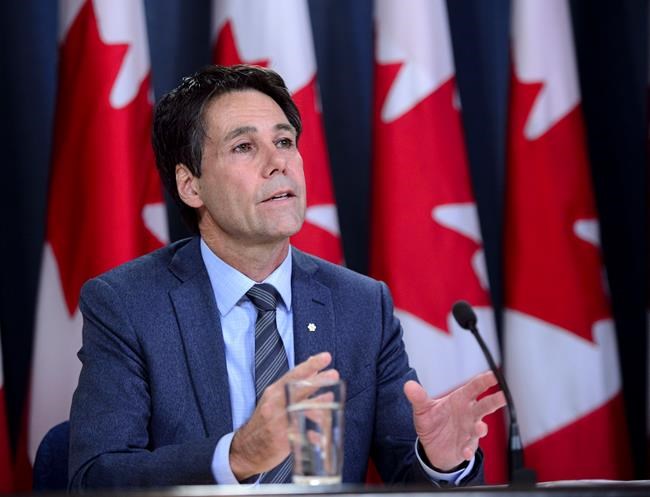National pharmacare program carries big risk, little reward
Read this article for free:
or
Already have an account? Log in here »
To continue reading, please subscribe:
Monthly Digital Subscription
$0 for the first 4 weeks*
- Enjoy unlimited reading on winnipegfreepress.com
- Read the E-Edition, our digital replica newspaper
- Access News Break, our award-winning app
- Play interactive puzzles
*No charge for 4 weeks then price increases to the regular rate of $19.00 plus GST every four weeks. Offer available to new and qualified returning subscribers only. Cancel any time.
Monthly Digital Subscription
$4.75/week*
- Enjoy unlimited reading on winnipegfreepress.com
- Read the E-Edition, our digital replica newspaper
- Access News Break, our award-winning app
- Play interactive puzzles
*Billed as $19 plus GST every four weeks. Cancel any time.
To continue reading, please subscribe:
Add Free Press access to your Brandon Sun subscription for only an additional
$1 for the first 4 weeks*
*Your next subscription payment will increase by $1.00 and you will be charged $16.99 plus GST for four weeks. After four weeks, your payment will increase to $23.99 plus GST every four weeks.
Read unlimited articles for free today:
or
Already have an account? Log in here »
Hey there, time traveller!
This article was published 04/11/2019 (2233 days ago), so information in it may no longer be current.
There’s a reason the federal Liberals will likely shelve plans for a national pharmacare program — at least the one recommended by its own advisory council earlier this year: it’s terrible policy.
The Liberals promised during the recent election to bring in some type of national prescription drug program. However, Prime Minister Justin Trudeau was evasive about its structure; he wouldn’t say whether the Liberal plan would replace coverage many Canadians already have through workplace insurance plans, nor what role the provinces would play.
In June, the Liberal-commissioned Advisory Council on the Implementation of National Pharmacare recommended Ottawa and the provinces negotiate a single-payer prescription drug program that would replace Canada’s “confusing patchwork” of existing provincial and private-sector plans.
The advisory council, chaired by former Ontario Liberal health minister Eric Hoskins, called the proposed plan the “unfinished business” of medicare, claiming it would reflect “what it means to be Canadian” if implemented. However, the 172-page report (which reads more like a political party platform than a serious public policy document) raises more questions than it answers.

The report recommends scrapping private-sector plans in favour of a government monopoly system that would determine which drugs are covered and which aren’t. Much like medicare, it wouldn’t be the federal government providing the drug coverage directly, it would be the provinces.
Under the proposed plan, Ottawa would offer money to participating provinces, who would have to comply with the terms of the program in order to receive funding. Those terms would be set out in federal legislation. Ottawa would fund the program through a new transfer payment, distinct from the Canada Health Transfer. If it’s anything like medicare, participating provinces would face fines for violating the terms of the legislation.
Provinces would be expected to continue funding whatever they’re paying for now through their own pharmacare plans, according to the advisory council. But they would have to expand to full-blown universal coverage where everyone would get “free” drugs for a small co-payment. The expanded coverage would supposedly be funded by Ottawa.
That’s a giant red flag for provinces: Ottawa loves making promises to fund “federal-provincial” programs, but often reneges on its financial responsibilities after the program is established.
Medicare is a perfect example. The federal government sets the rules through the Canada Health Act to determine funding eligibility for the $40 billion a year it doles out in health-care transfers. But Ottawa’s contribution to overall health-care costs has been declining for decades.
Why would a national pharmacare program be any different? And why would any province take on such a huge financial risk?
That’s a giant red flag for provinces: Ottawa loves making promises to fund “federal-provincial” programs, but often reneges on its financial responsibilities after the program is established.
The bigger question is why Canada needs a national pharmacare program at all?
At least 80 per cent of Canadians either have good prescription drug coverage or can afford to pay out of pocket. Only 10 to 20 per cent struggle to pay for drug costs, according to the advisory council report. Why not help those who need it and keep the rest of the system as is?
Proponents argue it’s not just about ensuring everyone has coverage. A national program would also be less expensive to run than the current public/private system, they say.
However, much of those savings would come from reduced drug coverage compared to private plans. There may be additional savings from bulk buying a national plan could provide, but provinces have already been pooling their resources to buy prescription drugs. There’s not enough savings to warrant scrapping tens of billions of dollars in private plans, forcing people to get prescription drugs from government, and further burdening cash-strapped provinces with future financial risks.

National pharmacare may sound good and wholesome on paper, but when you drill down into what’s being proposed, it would be a nightmare to administer.
There’s no objective reason to pursue it, since drug costs aren’t a problem for the vast majority of Canadians, and no one has figured out where Ottawa would find the more than $15 billion a year it would cost to fund it.
For all those reasons, it’s highly unlikely the federal government will adopt what its advisory council has proposed.
tom.brodbeck@freepress.mb.ca

Tom Brodbeck is an award-winning author and columnist with over 30 years experience in print media. He joined the Free Press in 2019. Born and raised in Montreal, Tom graduated from the University of Manitoba in 1993 with a Bachelor of Arts degree in economics and commerce. Read more about Tom.
Tom provides commentary and analysis on political and related issues at the municipal, provincial and federal level. His columns are built on research and coverage of local events. The Free Press’s editing team reviews Tom’s columns before they are posted online or published in print – part of the Free Press’s tradition, since 1872, of producing reliable independent journalism. Read more about Free Press’s history and mandate, and learn how our newsroom operates.
Our newsroom depends on a growing audience of readers to power our journalism. If you are not a paid reader, please consider becoming a subscriber.
Our newsroom depends on its audience of readers to power our journalism. Thank you for your support.









